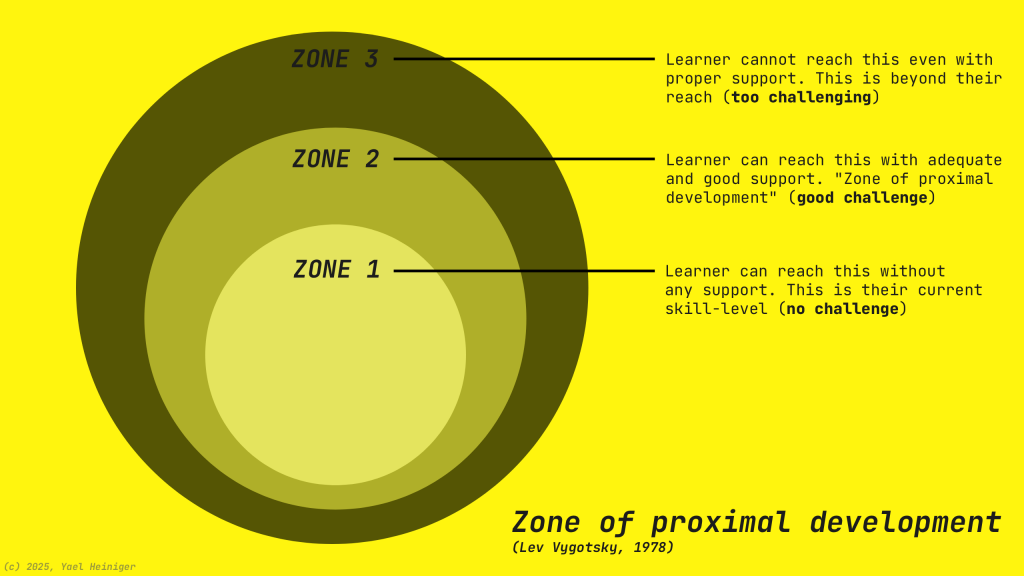Play-4-Future
The role of the zone of proximal development for EFL

Vygotsky’s zone of proximal development (from now on referred to as ZPD) captures a reality every teacher recognises: Meaningful learning happens when students work just beyond their current ability, nudging ever closer to full on proficiency but with the right scaffolding to avoid crashing and failing. This must be done via support in challenging yet manageable situations of genuine communication and not technical, mechanical application in controlled and non-challenging tasks. And this principle is not limited to psychology: It has direct, practical implications for how we design EFL classrooms and tasks.
Drama and improvisation naturally operate within this zone. They place learners in situations that require slightly more linguistic, social and pragmatic competence than they currently have at their disposal or command, while building scaffolding into the outlines of the scenariou. B that through peers, embodied cues, and shared context or a linguistic feature that is specifically at the center of attention (conjunctions, adverbs, opposites). Learners negotiate connotations, compare choices and use strategic communication to justify their position.
The same applies to improv-based guessing games or spontaneous role-plays. When students act out everyday scenes – returning to our examples from deep-dive 1 “Commuting to work”, going to the doctor & solving a misunderstandings – they practise the paralinguistic and pragmatic skills that scripted dialogues rarely capture. Questions such as How did you guess? What made this clearer? What language did we need here? help learners reflect on how communication actually works. They move beyond accuracy toward clarity, adaptability and intention.
If we want to take ZDP seriously, we’ll have to consider it on various levels. The following implications come to mind when using ZDP as a guiding principle for our (EFL) teaching:
Instruction must prioritise authentic communication.
IRF-pattern exchanges, rooted in correctness and teacher control, rarely push students into the ZPD. They must be reduced to a minimum in this context.
Drama-based tasks, in contrast, mirror real-world communicative demands and encourage learners to act as “thinking social actors” rather than passive responders. We hand over crontrol of the situation to our learners (scary, I know, but it pays out!)
Scaffolding should be social, dynamic and responsive.
In drama, scaffolding emerges through interaction: Peers model language, scenes provide context, and embodied cues lower cognitive load. We can help learners further by pre-teaching some language but we don’t want to define exact vocabulary. Chunks and functional language are good, vocabulary that specifically guides learners to one outcome are to be avoided.
Teachers guide rather than script, ensuring learners experience productive struggle instead of frustration. It is important to keep in mind that this zone of proximal development varies greatly between students and it is our task as teachers to know where each student’s current limits are. This leads us into point 3:
Assessment must become formative and continuous.
If learning unfolds through scaffolded interaction, evaluation must aknowledge and attend to growth as it happens, spot strategy use and aknowledge communicative effectiveness with praise!
Drama makes this visible in real time: who needs more support, who risks more, who is expanding their repertoire. It is important to pay attention to these subtle cues and adjust the lesson, scaffolding and aims in realtime. And don’t forget to take notes: What is written on the exam shows but a screenshot. Our goals are to empower students to be competent communicators. Where else could you possibly see this better than in real communication.
Critical language awareness can be developed within the ZPD.
Because drama exposes how language constructs relationships, identities and power, it offers opportunities to examine stereotypes and bias without overwhelming learners. Sensitive facilitation keeps them within a zone where reflection is possible but not threatening. Do not push learners into roles or situations they may not want to parttake in. If your drama and reflection is good, they’ll participate out of free will. We strive to communicate, this intrinsic motivation will be present if you do your job well. But do not push learners to parttake in possibly triggering discussions – at least not without the right amount of emotional distance.
Play-4-Future is proudly powered by WordPress